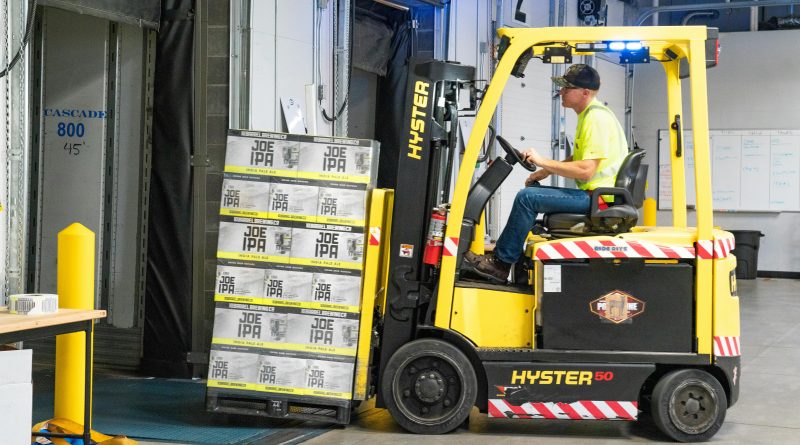Nearly All Forklift Accidents Are Preventable. So Why Are There So Many?
Most people would be shocked to hear about just how many forklift-related accidents there are annually. Though the number itself fluctuates, there are fatalities and serious injuries as a result of forklift accidents every year.
The vast majority of forklift accidents are preventable, so why are there still so many?
And what can we do about it?
The Root Causes of Forklift Accidents
These are some of the biggest and most common root causes of forklift accidents:
Lack of training and education. Many forklift operators who end up crashing were not properly trained or forklift certified. Forklifts aren’t ridiculously hard to operate, but there are many considerations that an operator needs to bear in mind to operate a forklift safely. There are also many OSHA standards and regulations that should be followed to maximize safety in a workplace environment. A person without the requisite training and education isn’t capable of understanding or recognizing all of these items; accordingly, they become much more likely to cause accidents. Making your employees forklift certified doesn’t guarantee that accidents won’t happen, but it does greatly minimize the possibility.
Improper turning. Forklift accidents also happen because of improper turning. This is especially dangerous when the forklift is currently carrying a heavy load. Turning is a precision operation, and even a relatively small misstep can lead to tipping or collision with an unseen object.
Speeding. We don’t think of forklifts as especially fast vehicles, as they aren’t designed to transport loads quickly. However, some forklift operators attempt to push the limits to maximize productivity or simply see what the machine can do. This is usually a bad idea; forklifts are much easier to control and are much safer when traveling at low speeds. The faster you travel, the less time you have to react, and the more likely it is that you’ll cause damage in the event of an accident.
Brake mistiming. The brakes on a forklift don’t work as responsibly as the brakes on a car, in part because of how heavy these machines are. Slowing the machine to a stop is a process that does take some time, so the brakes need to be applied early and consistently. Without immediate stopping power, many forklift operators find themselves in a position where the machine can no longer be stopped in time to avoid an accident.
Blind spots. Some forklift accidents occur simply because of neglected blind spots. Forklift operators can’t see all around them at all times, but it is their responsibility to check blind spots before moving the vehicle.
Pedestrian misconduct. Sometimes, accidents happen because of pedestrians who either aren’t paying attention or don’t take forklift safety seriously. They freely enter forklift blind spots, walk in the path of forklifts, or otherwise conduct themselves in ways that make them more likely to cause or be involved in an accident. Even merely distracting a forklift operator can be dangerous.
Inappropriate loads. Loading the forklift with a load that’s too heavy or imbalanced can cause an accident as well. Some people do this in an effort to save time. Others do it simply out of ignorance, failing to check limitations before finalizing their actions.
Showboating/goofing off. Becoming more experienced with a forklift means being able to control the machine with more skill and precision. However, some people take this as a license to showboat or goof off, inappropriately using the forklift. This is reckless and highly dangerous behavior that should be avoided at all costs.
Lack of communication. Solid, mutual communication is necessary to prevent forklift accidents. When employees aren’t communicating with each other, the risk of an accident goes up.
Mechanical failures. Some forklift accidents are a direct result of mechanical failures. This could be because the forklift itself was improperly built, because the forklift was improperly maintained, or because the forklift was misused in some critical way.
How to Prevent Forklift Accidents
So how do you prevent forklift accidents?
These strategies are your best tools:
Pursue forklift certification. Make sure all your forklift operators are properly educated and formally certified.
Establish a culture of safety. Safety culture makes sure that everyone on your team takes safety seriously and refuses to compromise on safety standards.
Mandate and enforce responsible forklift use. Use training, visuals, rewards, and disciplinary action to ensure everyone operates forklifts responsibly.
Maintain and replace as necessary. Pay close attention to the condition of your forklifts and be ready to maintain or replace them if they start showing signs of mechanical issues.
Fortunately, forklift accidents are relatively easy to prevent with the right strategies. If you want your workplace environment to be safer, all you have to do is make forklift safety a higher priority.
I’m a single mother of 2 living in Utah writing about startups, business, marketing, entrepreneurship, and health. I also write for Inc, Score, Manta, and Newsblaze

